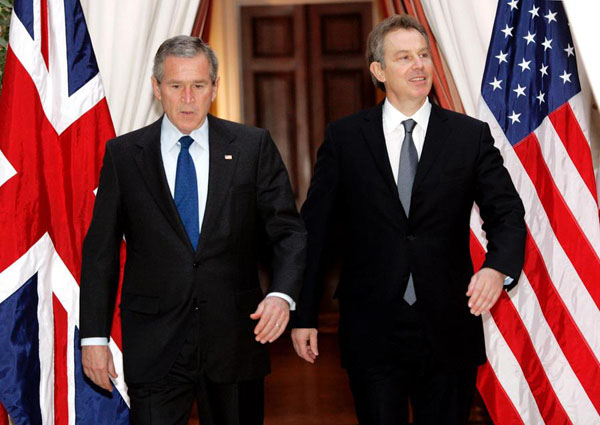UK criticised for going to war in Iraq before exhausting other options, report finds
Updated: 2016-07-06 19:17
By Chris Peterson in London(chinadaily.com.cn)
|
|||||||||
 |
|
US President George W. Bush (L) and British Prime Minister Tony Blair walk together from their meeting at the U.S. Embassy in Brussels, February 22, 2005. [Photo/Agencies] |
The UK government under Prime Minister Tony Blair went to war in Iraq in 2003 before all other options had been exhausted and on the basis of flawed intelligence, the official report into the conflict found.
Blair, who was prime minister from 1997 to 2008, took Britain to war in Iraq as part of a US-led coalition, ostensibly because Iraqi leader Saddam Hussein had weapons of mass destruction. In the 2003 invasion and aftermath which toppled Saddam, 179 British soldiers were killed.
In the event, no evidence of weapons of mass destruction, a euphemism for chemical or nuclear weapons, was found.
Blair has repeatedly been accused by UK politicians from all parties of being too close to the then US president, George W Bush.
The report, from a team headed by civil servant Sir John Chilcot, found that there had been serious intelligence failures, and a string of bad judgments made by senior officials.
Blair was criticised for being too close to US President George W Bush and for not discussing decisions with his government ministers and the full cabinet.
The decision to go to war was based on intelligence that was presented with a certainty "that was not justified," Chilcot said in announcing his findings.
Blair had written to Bush early on assuring him of his full support ``whatever happens" and Chilcot added "the UK was undermining the UN Security Council’s authority by going to war when it did."
"We have concluded that the decisions on the legal justification for the invasion were not satisfactory," he said.
"The case for a threat from weapons of mass destruction was presented with unjustified uncertainty," Chilcot said.
Chilcot said an estimated 150,000 Iraqi people, mainly civilians, had been killed in the invasion and its aftermath, and over 1 million Iraqis displaced.
"The intervention went badly wrong, and its consequences are felt to this day," he concluded.
The report, which took seven years to compiled and consists of 2.6 million words in 12 volumes, is three times as long as the works of William Shakespeare and five times as big as Leo Tolstory’s War and Peace.
Contact the reporter on chris@mail.chinadailyuk.com
Today's Top News
UK invasion of Iraq based on flawed intelligence: Report
UK invasion of Iraq was not last resort: Report
Berlusconi accepts Chinese offer for AC Milan
UK consultancy loses license, Chinese graduates being told to leave
Chinese online retailers offer 'Brexit sales' as sterling hits record lows
British PM race cut to 3 hopefuls
Suicide bombers hit three Saudi cities
Response to 'fully depend' on Manila
Hot Topics
Lunar probe , China growth forecasts, Emission rules get tougher, China seen through 'colored lens', International board,
Editor's Picks

|

|

|

|

|

|







